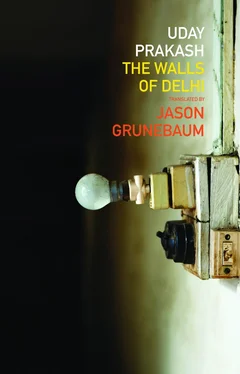And so one morning at the crack of dawn, while Mohandas was eating his breakfast of leftover rice and potatoes and getting ready for his appearance in court, the rapturous voice of Putlibai suddenly echoed throughout the house. She chirped like a merrymaking bird,
‘Little one! Devdas! Come quick and take a peek in the living room! I think the myna bird’s made herself a new nest, what do you think? Come quick!’
Mohandas was trying to finish his food as fast as he could so that he could get to court early; people had warned him that the judge who puffed mightily on his bidis was a stickler for starting on time. Five minutes late and he’d bump the case being heard to the following day and start straightaway on the next.
As he wolfed down his breakfast of stale rice and potatoes that’d have to last him the whole day, his blind old, bird-like mother sang out in a rapturous voice:
Sing the song of satguru
Sing the song of satguru
Sing the song of satguru and set your soul free
The chief executive of the Oriental Coal Mines, S.K. Singh, was not present in court. His lawyer was there to plead on his behalf. The company welfare officer A.K. Srivastav had brought his complete enquiry file with him, and gave it to the judge for his perusal, along with all supporting documents. Harshvarddhan Soni was deflated: of the three witnesses from Bichiya Tola he’d called to testify that the man who had been working at the Oriental Coal Mines for several years as a junior depot manager was their childhood friend Vishwanath, not Mohandas, two of them didn’t show up, and the third, Dinesh Kumar Sahu turned into a hostile witness and testified in front of the packed courtroom that Vishwanath was the real Mohandas. Then he pointed his finger at Harshvarddhan Soni and Mohandas and claimed that the two of them had one month ago come to his house and told him that they’d give him five thousand rupees for telling the court what they told him to say.
Judge Gajanan Madhav Muktibodh set the next hearing for one month’s time; Harshvarddhan and Mohandas were stunned.
They now pinned all their hopes on the report of the district magistrates. If Mohandas was going to get justice, it could only be when the truth came forward.
Harshvarddhan and Mohandas were speechless when, during the following court session, the reports of the district magistrates of Durg and Anuppur were presented. The investigations found that charges regarding the name and identity of Mohandas s/o Kabadas, deputy depot collector at the Oriental Coal Mines, were baseless. According to reliable testimony, circumstantial evidence, and after questioning several members of the grameen and panchayats, it was indisputably proven that Mohandas was Mohandas, and not Vishwanath.
Later they found out that Vishwanath had dropped ten thousand on the patwaris of the two districts, Durg and Anuppur, plus some hard liquor and spicy chicken. None other than Vijay Tiwari had picked up Bisnath in his police vehicle and helped him deliver the bribes to the patwaris. In any case, that was the real meaning of an inquiry headed by the collector, aka district magistrate, aka zilla adhikari: in the fine tradition of the administrative services, the inquiry was pawned off onto the lowly patwari. Whenever a court ordered a collector to make an inquiry, the collector would take note of the order, then send it to his subordinate, the SDM. The SDM would entrust the task to the tehsildar, who would order the sub-tehsildar to take care of it. That’s how it went, from the revenue inspector, aka IR, aka qanungo, until it finally landed in the lap of the patwari, who, finally, was the collector’s eyes and ears.
Bisnath and Vijay Tiwari handed over the stack of hundreds to Kamal Kishore, patwari of Bichiya Tola and Purbanra, plus a bottle of Macdowell’s No. 1 whisky, and butter chicken, and mutton seekh kabab — Kamal Kishore fell at the men’s feet in gratitude.
‘Have I ever let you down before? All this cash — Jesus and Krishna! With all this money I’ll turn a mouse into a moose, a club into a spade, a farm into a freeway!’ the patwari said all dreamy, jumping for joy while stuffing the money into his bag. He downed a triple of the Macdowell’s No. 1 in one shot, and just like that, right then and there, without moving an inch, the problem had been thoroughly investigated; the one-page white paper — a most official report — was readied, and the inquiry conducted by the district collector into the matter of Mohandas versus Vishwanath was completed in under fifteen minutes.
To put it another way, this rust-eaten steel frame of bureaucracy that had been readied for power by the English over subservient India had just transformed Bisnath, s/o Nagendranath, into Mohandas, s/o Kabadas.
Mohandas again broke down. He incanted the name of Kabir non-stop. He sat for hours in front of the little shrine to Malihamai. She only took the thickest, sweetest cream as an offering. And only from goat’s milk at that. High casters didn’t frequent her shrine. The thakurs, baniyas, babhnan, and lalas had their own gods and goddesses. Gosains, rather than brahmins, conducted her puja. It was said that brahmins who had shared food with dalits or adivasis, or who married them were called gosains in their own caste community.
Mohandas went to Khanra village and found Siu Narayan Gosain, and gave him twenty rupees and an uncooked mixture of dhal, rice, turmeric, and gur, with which he performed a puja to Malihamai; he also made an offering of a full half pound of fresh goat’s milk cream to the goddess.
Something else happened in the meantime. One morning at dawn, Kasturi was out in the fields doing her morning toilet with a couple of other women from the village. There was some commotion behind the bushes, as if someone was hiding.
For her own safety, Kasturi had taken to tucking a little scythe into her the waist of her trousers; she knew all too well that even after giving birth to two kids she was still the loveliest woman of the village. As long as she could remember she’d been subjected to the vulture-like stares of the local Brahmin slimeballs.
Kasturi stood up from her squat and removed the scythe from the cloth at her midriff. Holding it in her hand she approached the bush carefully; Ramoli, Sitiya, Chandna and Savitri followed.
‘Hey, now’s who’s that hiding behind the bush? Come on out, I’ll cool you down, you cunt wipe! What are you scared of, arse breath!’ screamed Kasturi. The rest of the women surrounded the bush, each with a lota in hand for washing their potties.
Chatradhari’s son Vijay Tiwari dashed out from behind the bush and ran off. His flabby body looked like a chubby watermelon as he scampered away in his boxers and undershirt.
Kasturi chased him for a bit, knife in hand. Ramoli, Sitiya and Savitri hurled their potty lotas after him. Inspector Vijay Tiwari ran as fast as he could, stumbling and tripping. The women screamed after him:
‘Call the TV station! They’ll get some great clips!’
‘Run away, run away! Big boy inspector is making fudge in his pants!’
Vijay Tiwari was now scared through and through. Who knows what kind of nonsense Mohandas and his lawyer Harshvarddhan Soni might cook up and publish in the papers or get shown on TV?
(All of this was happening at the time when, for the first time in Asian political history, an Indian woman was made member of the communist party politburo, while another woman kicked away the chair of the prime minster’s post.
It was the time when three non-stop giggling women were appointed members of the jury of the most important film festival where Ritwik Ghatak’s Subarnarekha or Kamol Gandhar or Shailandra’s Teesri Kasam were never even shown.
It was the time when a female US soldier working at Abu Ghraib prison stripped Iraqi prisoners naked and made them climb on top of one another to form some kind of pyramid, and then draped them with the American flag.
Читать дальше










